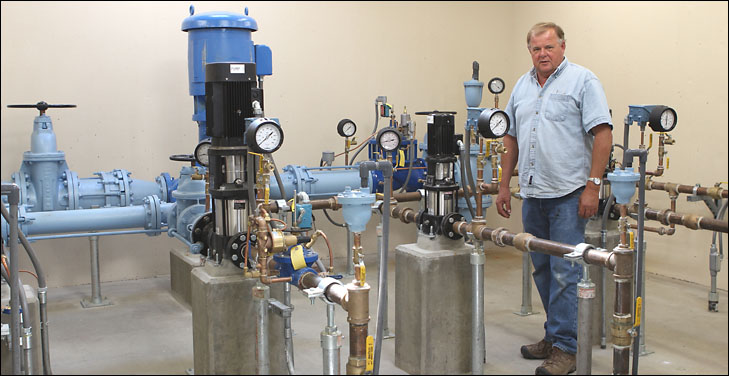home | internet service | web design | business directory | bulletin board | advertise | events calendar | contact | weather | cams

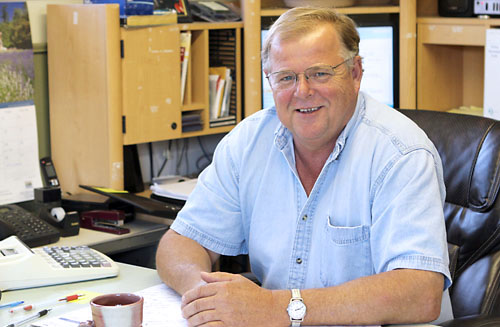 Twisp Superintendent of Public Works Howard Moss. Twisp Superintendent of Public Works Howard Moss.Can Do-er Howard Moss first visited Twisp to hear his then-girlfriend, singer Nancy Zahn, perform at the Twisp River Pub. Little did he know he’d end up running the town, so to speak. Today Moss is three years into a role he never foresaw: Public Works Superintendent for the Town of Twisp. He’s the man who makes sure town residents can drink their tap water and flush their toilets. He keeps the town pool swimmable, its streets driveable, its park park-like. He sees to it that fire hydrants have enough water and that town hall doesn’t collapse. “I like to keep things tidy and looking good,” says Moss, 57. With a two-year associate degree in civil engineering, he was hired as a youngster by his home town of Milton-Freewater, Oregon, as a utilities design draftsman. He rose to become the department’s superintendent of public works, overseeing multi-million dollar budgets for a town of 7,000 residents. 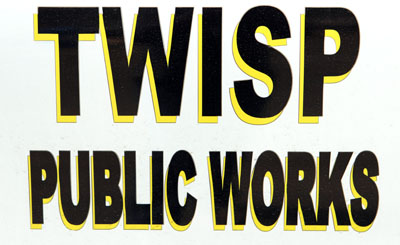 A simple sign for a world of many responsibilites. A simple sign for a world of many responsibilites.In Twisp this year he’s making do with $96,000 for streets, $130,000 for the pool and park, and $637,000 for waste-water treatment and domestic water supplies. After 30 years, Moss retired from his job in Oregon and moved to Wenatchee, where he used his carpentry skills to renovate and sell houses only to decide he wanted to get back into the public works profession. So he applied to take on the infrastructure challenges facing the Town of Twisp. He’s all over the place - painting stripes on streets while townsfolk sleep, keeping 60 vital town pumps pumping, clearing snow from the town’s 2,800-foot airport runway and from the town’s streets, constructing a new backboard for a park basketball hoop and wrangling paperwork for grants to build or maintain infrastructure. He has three full-time staffers—David Hunter, Dan Ayers and Lori Rodio, and one part-timer, Chris Colvin. Every day the team monitors and maintains each of the town’s life-sustaining systems. “It’s very clear that maintenance on all facilities has been deferred for many, many years,” says Moss of the town’s history of infrastructure neglect. “Things had just been let go.” And, he adds, “A lot of it was lack of professionalism.” Moss says he’s “proud as hell” of the work now being done by the Twisp town council, mayor, police department and his own department. “We’re a group of professionals.” When he was hired, Moss organized a work plan for things that had to be fixed to get the town’s systems up to par. Those fixes are about 75 percent completed, he says. 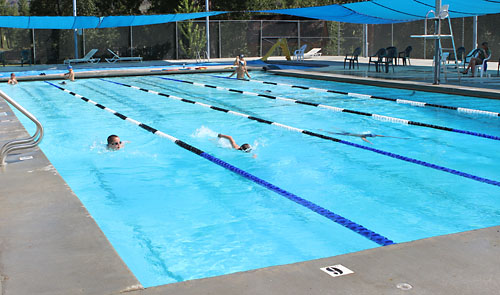 Twisp's Wagner Memorial Pool is a leaky gem. Twisp's Wagner Memorial Pool is a leaky gem.The town’s infrastructure improvements, some under way before his time, are impressive. So are its remaining challenges. Swimming Pool The leak-prone Wagner Memorial Pool was built in 1966. During the recent nine -hour power outage when the pump that keeps the pool’s water at proper levels wasn’t functioning, the pool lost 1.5 inches of water. That was 12,000 gallons, according to his calculations. The pool leaks constantly. “It’s getting really tired,” Moss says. “It’s not as if there’s a broken pipe somewhere. It’s a myriad of leaks typical of pools this age,” he explains. It’s a plaster-cast concrete pool, and he believes water is migrating out through the failing plaster that covers the concrete. 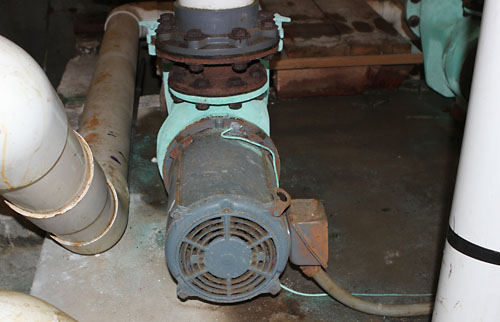 An old pump at the pool is failing. An old pump at the pool is failing.“There is a fix to it,” Moss says, and it would cost about $120,000. Is it worth it for a pool this old? “I believe so,” says Moss. “It’s a gem for the community.” Of public pools in the United States, he says, “I bet you can’t find one that’s profitable.” Adults pay $5 and kids $2.25 to use the Twisp pool, and Moss says it’s not feasible to ask kids to pay $7 or $8 to un-subsidize the pool. “We can keep this facility going but it will take an infusion of cash each year,” he says. He’s overseen construction of a municipal pool and estimates that a new one would cost about $2 million. This year community donors came up with the $17,000 needed to install a new pool boiler, and, Moss relates happily, “It purrs like a kitten.” At the same time, the aging structure continues to demand investment. At the moment, one of its pumps is failing; it will cost $5,400 to replace. Sewage One recent Monday morning Moss came to work to discover that one of the 16 underground diffuser pipes that discharge the town’s sewage from tanks into the Methow River was clogged. All in a day’s work; compressed air was blown through it and eventually the pipe was unclogged. 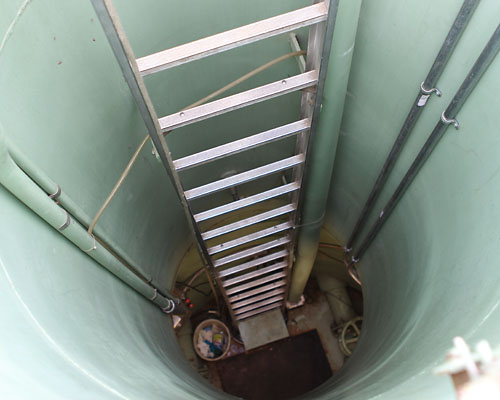 Each day a worker must climb down this shaft to ascertain that nothing has gone wrong at the sewage lift station. Each day a worker must climb down this shaft to ascertain that nothing has gone wrong at the sewage lift station.But, says Moss, unlike Winthrop, which has a sewage holding lagoon and thus isn’t required to treat its sewage to the level demanded of Twisp, “We do discharge into the pristine river. It can be a challenge at times” to keep sewage discharges within the permit limits, he says. Every day, a worker descends 22 feet down a narrow, claustrophobic, well-like enclosure to check instruments that show whether anything is going amiss at the lift station where all of the town’s sewage is routed into open tanks for secondary treatment at the sanitation plant at the end of Ewell Street. The sanitation department has its own lab at the site where workers test the effluent and keep records of what’s happening. When Moss arrived the town was about to sign on for a $700,000 loan to install a belt press system that would dewater sewage. Moss says he asked the council to hold off until the need for the belt press could be further evaluated. He wanted the information, he says, “before we plunged into another huge debt service to pay for 50 years.” “We’re constantly troubleshooting down here,” Moss says of the sewage treatment operation; the plant was built in 1974 and upgraded in 2001. The town shortly will have to obtain a new operating permit from the state’s Department of Ecology, and, says Moss, “There is a possibility that they’ll put the belt press on as a condition.” Meanwhile, sludge left in the tanks after the liquid has been discharged into the river is removed and trucked to be applied as fertilizer on land owned by Bill White, says Moss, who adds that it costs the town about $20,000 to haul away and dispose of its bio-solid waste in this manner. Water Twisp’s water history is roiled. In the spring flood of 1948 there was entirely too much of it; today, not so much. This town of just under 1,000 residents has only enough water in its state-allocated water reserve to allow 80 new residences to be built, says Moss.
The town is limited to 224 acre feet of water annually but in past years has exceeded its limit. A combination of water conservation improvements - smaller heads on the irrigation sprinklers at the town park, for instance - and repair of leaks in the town’s water delivery system has reduced water waste. Last year only 21 percent of the water supplied was lost in transit - still not acceptable but a considerable reduction from the past, according to Moss. Despite those losses, “We did not exceed it last year,” says Moss of the town’s allowable water withdrawal limit. Twisp is not required to treat its drinking water, obtained from two wells drilled 100 feet deep. Samples are gathered and tested for impurities two times a month, says Moss, usually from town facilities such as town hall or the pool. Twisp’s water meets state and federal safe drinking water standards, he says. 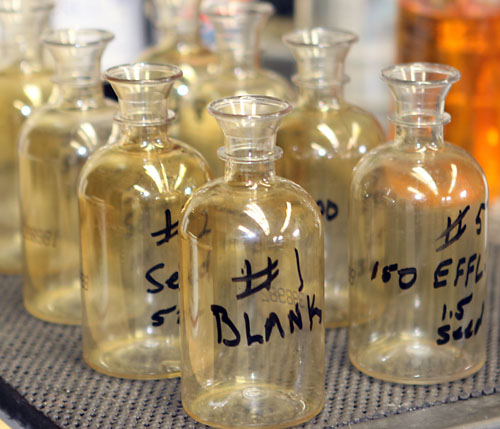 Sampling and lab tests are part of Howard Moss' responsibilities. Sampling and lab tests are part of Howard Moss' responsibilities.The town is paying about $40,000 a year on a 40-year loan (obtained before Moss was hired) to build a lift station to pipe water to Painter’s Addition on the hill west of town, where water pressure had fallen to 21 pounds per square inch (psi) but is supposed to be 25 psi, he explains. “There was no fire protection up there at all” from hydrants, Moss says. After installation of a state-of-the art system, Painter’s Addition residents now have 100 psi of water pressure. The system’s controls are housed in an underground bunker adjacent to two renovated tanks on the hillside that have a combined storage capacity of 230,000 gallons. It’s equipped with backup systems to deliver water should one pumping system fail. There’s also a large pump dedicated to fighting fires. “The fire protection system in some areas is very adequate and [in] some areas it’s not,” says Moss, who is working with Okanogan County Fire District 6 officials to get hydrants in all parts of town up to fire code. The town saw its fire safety rating drop from six to seven—on a 1 (best) to 10 scale— last year because of fire protection deficiencies, which can affect the insurance rates of businesses and homeowners. “We think we’ll be successful in lobbying that rating agency to get it back to six,” predicts Moss. Streets When the town announced that it would use a $334,000 state grant to repave Second, Third, Fourth and Fifth avenues from Highway 20 to Glover Street, and Twisp Avenue from Highway 20 to Magers Street, some townspeople wanted to know why the town didn’t pave the worst streets first, Moss recalls. His answer? “You go to the streets where the funding source will fund the work.” The streets to be repaired with that grant had to be classified as arterials. 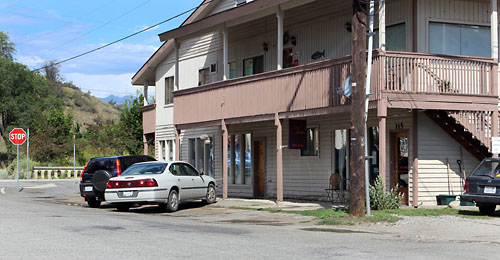 Sidewalks are coming to Third Avenue in Twisp, funded by a state grant. Sidewalks are coming to Third Avenue in Twisp, funded by a state grant.On the liberally pockmarked Methow Street, for example, there are about 300 little patches, says Moss. But that street is not an arterial, plus it must be completely rebuilt, so it did not fit the funding criteria. At the moment, Moss has only $12,000 in town funds to fix streets, and that sum would repair only 200 feet of Methow Street, he explains. A sidewalk will be installed on the un-sidewalked north side of Third Avenue (leading to the Farmers Market) between Glover Street and Highway 20 with grant funds. But no other sidewalk or curbing improvements will be made with that money, says Moss. Along Twisp Avenue from Highway 20 to Magers Street he says he will install a compacted gravel pathway for pedestrians. Gov. Jay Inslee and the legislature took money previously dedicated to street improvements and allocated it for education in an effort to comply with a court-ordered, constitutionally-mandated increase in basic education funding. “It’s a setback for small towns” such as Twisp that are faced with expensive infrastructure problems, he says. Residents tired of broken streets could elect to pay for neighborhood street improvements themselves by forming a Local Improvement District, (LID), Moss adds. But in recent years the matching funds that once made LIDs so popular have evaporated, he notes. Town Hall What to do about the formerly leaky Town Hall, which recently got a new, 15-year roof, is a conundrum for the town. The building does not meet building codes, says Moss; on three sides, it was built with hollow concrete blocks. 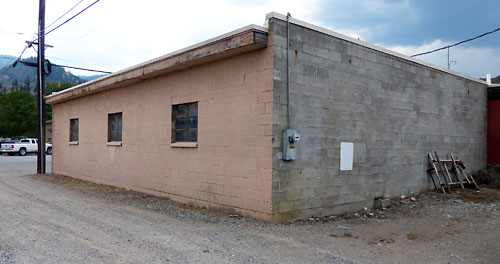 Moss used a loan to make emergency fixes to the ailing Twisp Town Hall, including strengthening the structure and getting a new roof. The back of the building shows in this photograph taken from the alley. Photo by Sheela McLean Moss used a loan to make emergency fixes to the ailing Twisp Town Hall, including strengthening the structure and getting a new roof. The back of the building shows in this photograph taken from the alley. Photo by Sheela McLeanWith a $60,000 loan to make emergency fixes to town hall, he installed the new roof, and “wherever I could, I put in vertical rebar” inside the concrete blocks to shore up walls. He cut the top off of cinderblocks, removed the center, laid horizontal rebar, then filled the hollow blocks with concrete. “It really wasn’t too much. I worked on it about three days,” he says. Another problem with town hall is that houses the public works shop, which Moss says he’d like to move to the sewage treatment plant. Having a shop running smoky diesel motors next to a public space is not a good idea, he says. This solution could free up administrative work space and possibly make the building more user-friendly for the public by creating room for a proper council chamber, he says. After an engineer identified the building’s structural deficiencies, joists in the shop were beefed up, a big steel header was installed in the police department, and the front windows of city hall were replaced and vertical beams installed between them to meet earthquake codes, says Moss. The next step is deciding if more should be done. Options range from doing nothing to building a new town hall, he says. A Wenatchee architect will present various options and costs to the town council in a month’s time, according to Moss. The quietly can-do, problem-solving attitude Moss brings to the job may best be illustrated by his Sani-can caper. When he was hired, he was told that vandals were in the messy habit of repeatedly tipping over the Sani-cans at the Twisp park. His solution? Pour a slab of concrete and bolt the Sani-cans to the slab. “End of problem,” he relates with evident satisfaction. The Sani-cans are emptied once a week. Still, Moss adds, “We’d like to have flushable restrooms,” and the town will apply for grants to build them, he says. “It’s a wonderful park down there and I think the public deserves flushable restrooms.” 8/5/2013 Comments Interviewing Howard many years ago for the Public Works Superintendent position was a great pleasure. He bailed us out of a huge staff bind back then, and has proven to be a blessing for this town. Thank you for highlighting his challenges and accomplishments to date. The people of Twisp benefit greatly everyday that Howard continues to serve this town. Let's all be really nice and helpful to him so he stays with us as long as possible... Thanks Howard! Hans Smith Twisp
|
